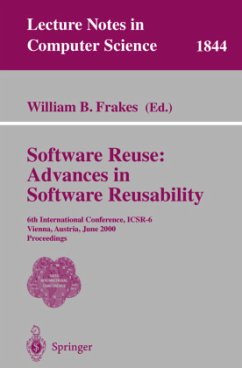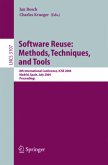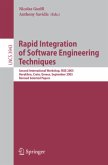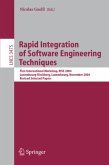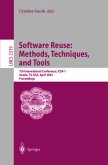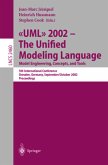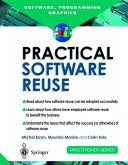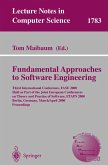William B. Frakes (ed.)6th International Conference, ICSR-6 Vienna, Austria, June 27-29, 2000 Proceedings
Software Reuse: Advances in Software Reusability
6th International Conference, ICSR-6 Vienna, Austria, June 27-29, 2000 Proceedings
Herausgegeben:Frakes, William B.
William B. Frakes (ed.)6th International Conference, ICSR-6 Vienna, Austria, June 27-29, 2000 Proceedings
Software Reuse: Advances in Software Reusability
6th International Conference, ICSR-6 Vienna, Austria, June 27-29, 2000 Proceedings
Herausgegeben:Frakes, William B.
- Broschiertes Buch
- Merkliste
- Auf die Merkliste
- Bewerten Bewerten
- Teilen
- Produkt teilen
- Produkterinnerung
- Produkterinnerung
This book constitutes the refereed proceedings of the 6th International Conference on Software Reuse, ICSR-6, held in Vienna, Austria, in June 2000. The 26 revised full papers presented were carefully reviewed and selected from numerous submissions. The book is divided into topical sections on generative reuse and formal description languages, object-oriented methods, product line architectures, requirements reuse and business modeling, components and libraries, and design patterns.
Andere Kunden interessierten sich auch für
![Software Reuse: Methods, Techniques, and Tools Software Reuse: Methods, Techniques, and Tools]() Jan Bosch / Charles Krueger (eds.)Software Reuse: Methods, Techniques, and Tools39,99 €
Jan Bosch / Charles Krueger (eds.)Software Reuse: Methods, Techniques, and Tools39,99 €![Rapid Integration of Software Engineering Techniques Rapid Integration of Software Engineering Techniques]() Nicolas Guelfi / Anthony Savidis (eds.)Rapid Integration of Software Engineering Techniques39,99 €
Nicolas Guelfi / Anthony Savidis (eds.)Rapid Integration of Software Engineering Techniques39,99 €![Rapid Integration of Software Engineering Techniques Rapid Integration of Software Engineering Techniques]() Nicolas Guelfi (ed.)Rapid Integration of Software Engineering Techniques39,99 €
Nicolas Guelfi (ed.)Rapid Integration of Software Engineering Techniques39,99 €![Software Reuse: Methods, Techniques, and Tools Software Reuse: Methods, Techniques, and Tools]() Cristina Gacek (ed.)Software Reuse: Methods, Techniques, and Tools39,99 €
Cristina Gacek (ed.)Software Reuse: Methods, Techniques, and Tools39,99 €![UML 2002 - The Unified Modeling Language: Model Engineering, Concepts, and Tools UML 2002 - The Unified Modeling Language: Model Engineering, Concepts, and Tools]() Jean-Marc Jezequel / Heinrich Hussman / Stephen Cook (eds.)UML 2002 - The Unified Modeling Language: Model Engineering, Concepts, and Tools39,99 €
Jean-Marc Jezequel / Heinrich Hussman / Stephen Cook (eds.)UML 2002 - The Unified Modeling Language: Model Engineering, Concepts, and Tools39,99 €![Practical Software Reuse Practical Software Reuse]() Michel EzranPractical Software Reuse38,99 €
Michel EzranPractical Software Reuse38,99 €![Fundamental Approaches to Software Engineering Fundamental Approaches to Software Engineering]() Tom Maibaum (ed.)Fundamental Approaches to Software Engineering39,99 €
Tom Maibaum (ed.)Fundamental Approaches to Software Engineering39,99 €-
-
-
This book constitutes the refereed proceedings of the 6th International Conference on Software Reuse, ICSR-6, held in Vienna, Austria, in June 2000.
The 26 revised full papers presented were carefully reviewed and selected from numerous submissions. The book is divided into topical sections on generative reuse and formal description languages, object-oriented methods, product line architectures, requirements reuse and business modeling, components and libraries, and design patterns.
The 26 revised full papers presented were carefully reviewed and selected from numerous submissions. The book is divided into topical sections on generative reuse and formal description languages, object-oriented methods, product line architectures, requirements reuse and business modeling, components and libraries, and design patterns.
Produktdetails
- Produktdetails
- Lecture Notes in Computer Science 1844
- Verlag: Springer / Springer Berlin Heidelberg / Springer, Berlin
- Artikelnr. des Verlages: 978-3-540-67696-6
- 2000.
- Seitenzahl: 468
- Erscheinungstermin: 14. Juni 2000
- Englisch
- Abmessung: 235mm x 155mm x 26mm
- Gewicht: 653g
- ISBN-13: 9783540676966
- ISBN-10: 3540676961
- Artikelnr.: 23386352
- Herstellerkennzeichnung
- Springer-Verlag GmbH
- Tiergartenstr. 17
- 69121 Heidelberg
- ProductSafety@springernature.com
- Lecture Notes in Computer Science 1844
- Verlag: Springer / Springer Berlin Heidelberg / Springer, Berlin
- Artikelnr. des Verlages: 978-3-540-67696-6
- 2000.
- Seitenzahl: 468
- Erscheinungstermin: 14. Juni 2000
- Englisch
- Abmessung: 235mm x 155mm x 26mm
- Gewicht: 653g
- ISBN-13: 9783540676966
- ISBN-10: 3540676961
- Artikelnr.: 23386352
- Herstellerkennzeichnung
- Springer-Verlag GmbH
- Tiergartenstr. 17
- 69121 Heidelberg
- ProductSafety@springernature.com
Generative Reuse and Formal Domain Languages.- A New Control Structure for Transformation-Based Generators.- Palette: A Reuse-Oriented Specification Language for Real-Time Systems.- From Application Domains to Executable Domains: Achieving Reuse with a Domain Network.- Reuse of Knowledge at an Appropriate Level of Abstraction - Case Studies Using Specware.- Object Oriented Methods 1.- Building Customizable Frameworks for the Telecommunications Domain: A Comparison of Approaches.- Object Oriented Analysis and Modeling for Families of Systems with UML.- Framework-Based Applications: From Incremental Development to Incremental Reasoning.- Product Line Architectures.- Achieving Extensibility through Product-Lines and Domain-Specific Languages: A Case Study.- Implementing Product-Line Features with Component Reuse.- Representing Requirements on Generic Software in an Application Family Model.- Implementation Issues in Product Line Scoping.- Requirements Reuse and Business Modeling.- Requirements Classification and Reuse: Crossing Domain Boundaries.- Reuse Measurement in the ERP Requirements Engineering Process.- Business Modeling and Component Mining Based on Rough Set Theory.- Components and Libraries.- Visualization of Reusable Software Assets.- Reasoning about Software-Component Behavior.- Use and Identification of Components in Component-Based Software Development Methods.- Promoting Reuse with Active Reuse Repository Systems.- Design Patterns.- A Method to Recover Design Patterns Using Software Product Metrics.- Object Oriented Design Expertise Reuse: An Approach Based on Heuristics, Design Patterns and Anti-patterns.- Patterns Leveraging Analysis Reuse of Business Processes.- Constructional Design Patterns as Reusable Components.- Object Oriented Methods 2.- ATwo-Dimensional Composition Framework to Support Software Adaptability and Reuse.- Structuring Mechanisms for an Object-Oriented Formal Specification Language.- Software Reuse in an Object Oriented Framework: Distinguishing Types from Implementations and Objects from Attributes.- Compatibility Elements in System Composition.
Generative Reuse and Formal Domain Languages.- A New Control Structure for Transformation-Based Generators.- Palette: A Reuse-Oriented Specification Language for Real-Time Systems.- From Application Domains to Executable Domains: Achieving Reuse with a Domain Network.- Reuse of Knowledge at an Appropriate Level of Abstraction - Case Studies Using Specware.- Object Oriented Methods 1.- Building Customizable Frameworks for the Telecommunications Domain: A Comparison of Approaches.- Object Oriented Analysis and Modeling for Families of Systems with UML.- Framework-Based Applications: From Incremental Development to Incremental Reasoning.- Product Line Architectures.- Achieving Extensibility through Product-Lines and Domain-Specific Languages: A Case Study.- Implementing Product-Line Features with Component Reuse.- Representing Requirements on Generic Software in an Application Family Model.- Implementation Issues in Product Line Scoping.- Requirements Reuse and Business Modeling.- Requirements Classification and Reuse: Crossing Domain Boundaries.- Reuse Measurement in the ERP Requirements Engineering Process.- Business Modeling and Component Mining Based on Rough Set Theory.- Components and Libraries.- Visualization of Reusable Software Assets.- Reasoning about Software-Component Behavior.- Use and Identification of Components in Component-Based Software Development Methods.- Promoting Reuse with Active Reuse Repository Systems.- Design Patterns.- A Method to Recover Design Patterns Using Software Product Metrics.- Object Oriented Design Expertise Reuse: An Approach Based on Heuristics, Design Patterns and Anti-patterns.- Patterns Leveraging Analysis Reuse of Business Processes.- Constructional Design Patterns as Reusable Components.- Object Oriented Methods 2.- ATwo-Dimensional Composition Framework to Support Software Adaptability and Reuse.- Structuring Mechanisms for an Object-Oriented Formal Specification Language.- Software Reuse in an Object Oriented Framework: Distinguishing Types from Implementations and Objects from Attributes.- Compatibility Elements in System Composition.

